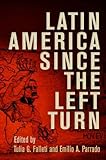Latin America Since the Left Turn / ed. by Tulia G. Falleti, Emilio A. Parrado.
Material type: TextSeries: Democracy, Citizenship, and ConstitutionalismPublisher: Philadelphia : University of Pennsylvania Press, [2017]Copyright date: ©2018Description: 1 online resource (384 p.) : 9 illusContent type:
TextSeries: Democracy, Citizenship, and ConstitutionalismPublisher: Philadelphia : University of Pennsylvania Press, [2017]Copyright date: ©2018Description: 1 online resource (384 p.) : 9 illusContent type: - 9780812294552
- 980.04 23
- F1414.3 .L38 2018eb
- online - DeGruyter
| Item type | Current library | Call number | URL | Status | Notes | Barcode | |
|---|---|---|---|---|---|---|---|
 eBook
eBook
|
Biblioteca "Angelicum" Pont. Univ. S.Tommaso d'Aquino Nuvola online | online - DeGruyter (Browse shelf(Opens below)) | Online access | Not for loan (Accesso limitato) | Accesso per gli utenti autorizzati / Access for authorized users | (dgr)9780812294552 |
Frontmatter -- CONTENTS -- Introduction -- PART I. NATIONAL AND REGIONAL MODELS OF DEVELOPMENT -- 1. Latin American Development: Perspectives and Debates -- 2. Fiscal Policy, Income Re distribution, and Poverty Reduction in Argentina, Bolivia, Brazil, Mexico, Peru, and Uruguay: An Overview -- 3. Social Investment in Latin America -- 4. Debt, Democracy, and Post-Neoliberalism: Thirty Years of Regional Integration in Latin America -- 5. Mercosur and Regional Migration: A Human Rights Approach -- PART II. DEMOCRACY AND ITS DISCONTENTS -- 6. Venezuela Between Two States -- 7. From Partial to Full Conflict Theory: A Neo-Weberian Portrait of the Battle for Venezuela -- 8. Populism or Democracy? Reexamining the Role of “the People” in Twenty- First-Century Latin American Politics -- PART III. CITIZENSHIP, CONSTITUTIONALISM, AND PARTICIPATION -- 9. Constitutional Changes and Judicial Power in Latin America -- 10. Agents of Neoliberalism? High Courts, Legal Preferences, and Rights in Latin America -- 11. Experimenting with Participation and Deliberation in Latin America: Is Democracy Turning Pragmatic? -- 12. The Gattopardo Era: Innovation and Representation in Mexico in Post-Neoliberal Times -- PART IV. RACE, DECOLONIZATION, AND VIO LENCE -- 13. Anti- imperial, But Not Decolonial? Vasconcelos on Race and Latin American Identity -- 14. Decolonization and Plurinationality -- 15. Postwar El Salvador: Entangled Aftermaths -- CONTRIBUTORS -- INDEX -- ACKNOWL EDGMENTS
restricted access online access with authorization star
http://purl.org/coar/access_right/c_16ec
In the early twenty-first century, the citizens of many Latin American countries, such as Argentina, Bolivia, Brazil, Ecuador, and Venezuela, elected left-wing governments, explicitly rejecting and attempting to reverse the policies of neoliberal structural economic adjustment that had prevailed in the region during the 1990s. However, in other countries such as Chile, Colombia, Mexico, and Peru continuity and even extension of the neoliberal agenda have been the norm.What were the consequences of rejecting the neoliberal consensus in Latin America? Why did some countries stay on the neoliberal course? Contributors to Latin America Since the Left Turn address these questions and more as they frame the tensions and contradictions that currently characterize Latin American societies and politics. Divided into three sections, the book begins with an examination of the political economy, from models of development, to taxation and spending patterns, to regionalization of trade and human migration. The second section analyzes the changes in democracy and political identities. The last part explores the themes of citizenship, constitutionalism, and new forms of civic participation. With essays by the foremost scholars in the field, Latin America Since the Left Turn not only delves into the cases of specific countries but also surveys the region as a whole.Contributors: Isabella Alcañiz, Sandra Botero, Marcella Cerrutti, George Ciccariello-Maher, Tula G. Falleti, Roberto Gargarella, Adrian Gurza Lavalle, Juliet Hooker, Evelyne Huber, Ernesto Isunza Vera, Nora Lustig, Paulina Ochoa Espejo, Emilio A. Parrado, Claudiney Pereira, Thamy Pogrebinschi, Irina Carlota Silber, David Smilde, John D. Stephens, Maristella Svampa, Oscar Vega Camacho, Gisela Zaremberg.
Mode of access: Internet via World Wide Web.
In English.
Description based on online resource; title from PDF title page (publisher's Web site, viewed 30. Aug 2021)


